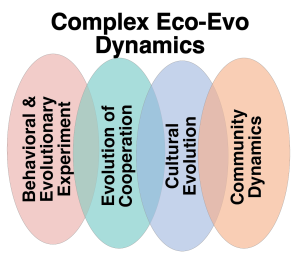Complex Dynamics in Ecology and Evolution
 Ecological and evolutionary dynamics show complex and counter-intuitive phenomena such as cooperative behaviors, coexistence of multiple species, and feedback among cultural evolution, genetic evolution, and ecological dynamics.
Ecological and evolutionary dynamics show complex and counter-intuitive phenomena such as cooperative behaviors, coexistence of multiple species, and feedback among cultural evolution, genetic evolution, and ecological dynamics.
I have investigated such dynamics using mathematical models, data analysis, and laboratory experiments.
Evolution of cooperation
Cooperative behaviors, helping others at the cost of actors’ payoff, have spread to many organisms, from bacteria to humans. I have investigated the evolution of two cooperative behaviors in the social amoeba (i.e., fruiting body and macrocyst formation )using the evolutionary game models and simple experiments; see Shibasaki et al (2017) and Shibasaki and Shimada (2017, 2018).
Detoxification can be another example of cooperation. The evolution of this cooperative behavior depends on the toxin concentration in the system. By combining the evolution of private resistance to the toxin (i.e., decreasing death rates without changing the environmental toxin concentration), the evolution of detoxification can be cyclic; see Shibasaki and Mitri (2020).
Community dynamic
The coexistence of multiple species has been a central question in ecology. Studies show environmental changes and spatial structure play important roles in biodiversity. For example, the combination of environmental changes and demographic stochasticity produces complex patterns of beta diversity in multi-species communities; see Shibasaki et al. (2021). In bacterial communities, species interactions are mediated by environments; their interactions occur via changing resource and toxin concentrations. This enables upstream species to affect the dynamics in downstream communities in rivers and guts. We analyzed how the upstream community affects the stability of the downstream community; see Shibasaki and Mitri (2023).
Cultural Evolution
Evolution can occur both in genes and cultures. Recent studies suggest that cultural evolution, genetic evolution, and ecology relate to one another. For example, the contents of folklore are restricted by local animals and climatic conditions; see Shibasaki et al (under review).
In addition, innovation depends on the diversity of ideas and the interaction networks. We suggest that the recent development of artificial intelligence, particularly large language models, may harm human culture and innovation; see Nakadai, Nakawake, and Shibasaki (2023).
Evolutionary experiments
Coming soon.